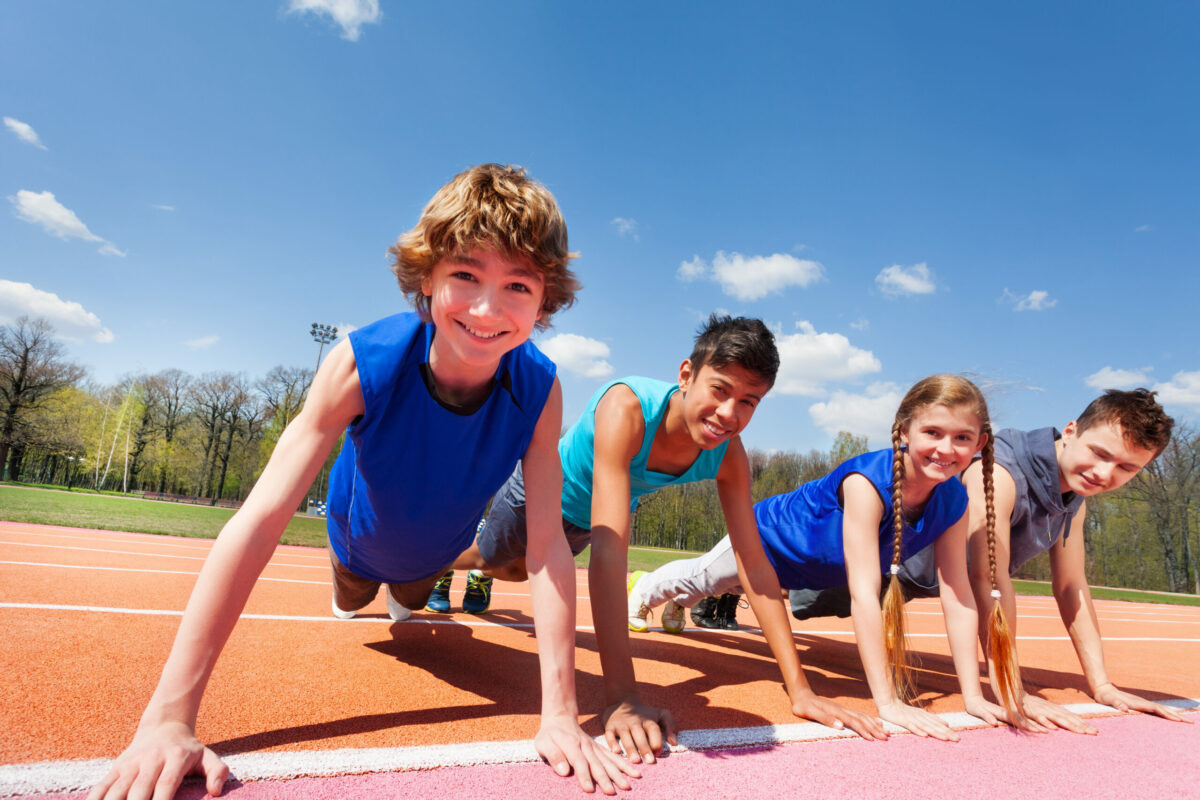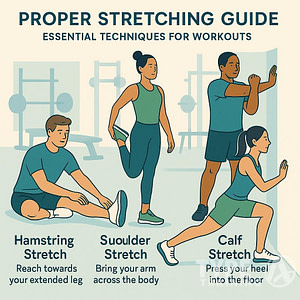Engaging children in physical activity is not only vital for their health, but it also lays the groundwork for lifelong habits of discipline and focus.
When selecting workouts for your kids, consider exercises that are not only fun but also enhance their ability to concentrate and remain committed.
Well-structured physical activities can provide the perfect blend of discipline and excitement.
Introducing your children to basic building block exercises like squats, press-ups, and pull-ups is a great start.
Popular posts:
These simple movements help in building strength and teach your children the importance of maintaining proper form—a foundation for discipline in any physical activity.
Teaching kids to concentrate on their movements helps improve their focus, which can be beneficial across all areas of life.
Additionally, incorporating workouts that marry physical exertion with mental focus can be highly effective.
Activities such as a mini martial arts session not only keep the body active but also instill a sense of self-discipline and respect.
The practice of martial arts is excellent for children as it requires a high level of attention and precision, fostering a sharp mind and a strong body.
Laying the Groundwork for Discipline and Focus
In shaping your child’s ability to maintain discipline and focus, you establish the essential habits that lead to a healthy lifestyle and a strong character.
Understanding Discipline and Focus in Children
Discipline in children is more than just rules and punishment; it is about creating a consistent structure that helps them understand expectations and the reasons behind them.
This understanding leads to self-discipline, which is crucial for maintaining focus.
When you teach your children discipline, you’re also teaching them attention to detail and respect for themselves and others.
The Role of Physical Activity in Child Development
Integrating physical activity into your child’s daily routine is a strategic approach to developing both their physical and mental abilities.
Young athletes, for instance, often demonstrate improved focus and a higher sense of self-discipline as a result of their training.
Whether it’s through structured sports or playful exercise, encouraging your kids to move builds not just muscles, but also mental fortitude, laying a foundation for a healthy lifestyle.
Designing Age-Appropriate Workouts for Kids
When creating a workout plan for children, it’s crucial to focus on exercises that foster concentration, control, and muscle development.
These workouts should be fun yet challenging enough to hold their attention and build their strength.
Workouts That Promote Concentration and Control
For young minds, mastering basic moves that require focus can significantly enhance concentration. Consider routines like:
- Yoga: Yoga poses improve balance and concentration through sustained postures that children must hold.
- Martial Arts: These practices not just teach self-defense but also discipline, as kids learn sequences of movements that demand attention and precision.
Incorporating these types of activities can be highly beneficial for a child’s mental and physical coordination.
Strength-Building Exercises for Young Muscles
When it comes to building strength in children, emphasis should be on exercises that target multiple muscle groups without overexerting young bodies.
Suitable exercises include:
- Bodyweight Squats: These engage the core, glutes, and leg muscles, forming a strong foundation for other activities.
- Push-ups: Modified or full push-ups help in strengthening the upper body and core.
Always ensure that children maintain proper form to maximize the benefits of each exercise and prevent injury.
Incorporating Fun and Games into Fitness
Incorporating games into fitness routines can significantly enhance kids’ focus, balance, agility, and coordination.
Through playful activities, you can transform your living room or backyard into a dynamic environment where exercise feels like fun.
Engaging Games to Teach Kids Focus and Mindfulness
Interactive games like Simon Says and Red Light, Green Light are not only enjoyable but also improve attention and listening skills.
These games require quick thinking and fast reactions, thus improving coordination and agility.
For more ways to incorporate mindfulness and focus into play, consider the exercises highlighted on SplashLearn.
- Simon Says: A leader gives commands, but players only follow when the phrase starts with “Simon says.” This game emphasizes mindfulness as children must concentrate and follow specific instructions.
- Red Light, Green Light: One person plays the ‘traffic light’ and the others try to touch them. When the ‘traffic light’ says green light, kids move forward, and they must stop when a red light is called. This game promotes attention to cues and teaches impulse control.
Ideas for an Active Living Room or Backyard Obstacle Course
Transform your living room or backyard into a thrilling obstacle course that encourages athleticism and inventiveness. Here are specific elements to include:
- Balance Beam: Use a strip of tape on the floor as a beam to walk on; this hones balance.
- Cushion Hops: Scatter cushions or pillows around for children to leap from one to another, which develops agility.
- Tunnel Crawls: Create tunnels using chairs and blankets to crawl under, enhancing both coordination and athleticism.
Have a Dance Party using energetic music to get kids moving; it’s an excellent way to nurture coordination through rhythm and a fun way to introduce aerobic exercise.
Mind-Body Connection Workouts
Maintaining discipline and focus is integral for children’s development. Specific workouts that emphasize the mind-body connection can lead to improvements in self-control, balance, and concentration.
These exercises are not only fun but also crucial in teaching kids how to synchronize their movements with their mental state.
Yoga Adventure: A Journey to Self-Control and Focus
Yoga is more than just physical activity; it’s a holistic journey towards mastering self-control and focus.
Programs like Cosmic Kids Yoga offer engaging yoga experiences that capture young imaginations, guiding them through stories and adventures.
By assuming yoga poses and progressing through a narrative, children enhance their concentration and coordination, all while learning to maintain balance and stamina.
Here’s a simple guide to starting a yoga adventure:
- Choose an Adventure Theme: Pick a storyline that your child loves. Whether it’s an outer space journey or an underwater exploration, the theme will provide context for the yoga poses.
- Set the Scene: Use a quiet, comfortable space that allows for free movement and minimal distractions.
- Follow Along: Whether through a video or a guidebook, ensure each yoga pose is explained with its relevance to the adventure.
Incorporate regular sessions to help solidify these skills. Consistency leads to profound effects on children’s mental and physical wellness, as highlighted in an article about mind-body connection workouts.
Dance Moves and Rhythms to Enhance Coordination
Dance is another excellent way to connect the mind and body, helping kids to develop rhythmic coordination and self-control.
With every move, dance prompts kids to pay attention to the music and their bodies’ responses.
Here’s how to get started:
- Find a Style: Choose a dance genre that excites your child. Be it hip-hop, ballet, or multicultural dances, each style offers unique benefits.
- Learn the Basics: Begin with simple, foundational moves to build confidence and a sense of rhythm.
- Practice Regularly: Regular practice allows children to improve their muscle memory and coordination, making more complex sequences easier to master over time.
Using dance as a medium for exercise can provide an excellent outlet for energy and creativity. Incorporating dance moves for teaching discipline and focus can have lasting positive effects on a child’s capacity to learn and apply themselves in various aspects of life.
Developing a Routine for Regular Exercise
Establishing a regular exercise routine is essential for teaching kids the value of discipline and focus.
A well-structured approach with a balance of routines supports physical development and encourages a lifelong habit of healthy living.
Crafting a Weekly Exercise Schedule for Kids
To instill discipline and structure, your weekly exercise schedule should be a mix of varied physical activities that cater to different aspects of fitness.
Start by designating specific times each day for exercise, ensuring consistency which is key for building a routine.
Next, draft a balanced plan that can include:
- Monday: 30 minutes of general aerobic activities (e.g., cycling, swimming)
- Wednesday: 20 minutes of whole-body exercises such as squats and sit-ups
- Friday: Skill-based activities like gymnastics or martial arts classes that emphasize discipline and focus
Incorporate physical activity into daily routines by including short bursts of exercise, like jumping jacks or running on the spot.
Simple Warm-Up and Cool-Down Routines to Prevent Injuries
Warm-ups are crucial for preparing your child’s body for exercise and preventing injuries. A simple routine can begin with:
- 5 minutes of dynamic stretching: leg swings, arm circles
- Brisk walking or light jogging: to gradually increase the heart rate
Following the active session, a cool-down helps the body to recover:
- Stretching: focus on major muscle groups to enhance flexibility
- Breathing exercises: calm the body, signal transition out of exercise mode
Routine jumps in energy levels are normal for kids, so warm-ups and cool-downs can also serve to regulate excitement before and after workouts.
Promoting Mental and Emotional Benefits Through Physical Activity
Physical activity plays a significant role in enhancing your child’s mental and emotional well-being, with structured exercise being a potent tool for developing discipline and focus.
Using Exercise to Improve Attention to Detail and Working Memory
Exercise is a powerful means to boost your child’s attention to detail. Tasks that require precision, like martial arts or gymnastics, compel young minds to concentrate on their movements. This kind of focused activity reinforces neural pathways related to working memory and attention, improving performance in and out of the classroom.
Examples of exercises to improve attention to detail:
- Martial arts: Routine practices enhance precision and patience.
- Gymnastics: Concentration is key when performing complex routines.
Through mindfulness during physical activity, children learn to pay closer attention to their actions, which manifests as improved attention to detail in other areas of their lives.
How Physical Activity Can Alleviate Stress and Anxiety in Kids
Incorporating physical activity into your child’s routine can be a robust tool for combating stress and anxiety. Regular exercise initiates the release of endorphins, contributing to a sense of calm and happiness. Additionally, sports and outdoor play provide a constructive outlet for excess energy, which can be particularly beneficial for children who experience anxiety The Benefits of Exercise for Children’s Mental Health.
Activities that help alleviate stress and anxiety:
- Team sports: Collaboration and social interaction can reduce feelings of stress.
- Yoga: Enhances mindfulness and focuses on controlled, calming breathing.
By anchoring a sense of mental strength and resilience, physical activity equips children with the coping skills necessary to deal with stress. Regular participation in sports and physical exercises can foster a sense of achievement and confidence, further reinforcing their ability to manage anxiety.
Supportive Parenting for a Disciplined Lifestyle
In fostering discipline and focus in children, supportive parenting is essential. Your guidance can instill self-discipline, help kids learn from their mistakes, and achieve a balanced lifestyle.
Teaching Responsibility and Learning From Mistakes
Encouraging responsibility in your child paves the way for them to develop strong problem-solving skills. Start by setting clear expectations and a consistent routine, which are fundamental in teaching them how to manage their time and responsibilities effectively. When mistakes occur, use them as teachable moments rather than occasions for punishment. For instance, if your child neglects their homework, guide them to understand the consequences and help them devise a plan to prevent future issues. This approach not only helps in building discipline but also develops their ability to handle challenges independently.
Balancing Social Time and Fitness for Well-Rounded Development
A well-rounded development in children requires a balance between social time and fitness. As a parent, you can create a weekly schedule that includes time for friends and physical activity. Encourage activities that require cooperation and teamwork, reinforcing social skills alongside physical health. For example, participation in team sports can improve their fitness while also teaching valuable lessons in teamwork and communication. Emphasize the importance of this balance to your child to show them how maintaining relationships and staying active are equally important for a disciplined and focused lifestyle.
Frequently Asked Questions
Discover how specific workouts designed for kids can nurture discipline and sharpen focus, and understand the frequency and types of exercises that can positively shape a child’s behavioral development.
What are effective exercise routines to improve discipline in children?
Effective exercise routines to improve discipline in children include building block exercises such as squats and press-ups. Teaching these foundational movements can instill discipline through structured learning and repetition.
How can physical activity enhance focus in children?
Physical activity can enhance focus in children by providing full-engagement focus activities that challenge their concentration, such as dance with structured challenges or coordination-based sports, allowing them to practice sustaining attention on a single task.
What age-appropriate workouts help increase a child’s attention span?
Workouts such as dance parties, obstacle courses, and focus exercises are age-appropriate methods to increase a child’s attention span, with an emphasis on fun and engaging tasks that require steady concentration.
Can regular exercise impact a child’s behavioral development positively?
Yes, regular exercise can have a positive impact on a child’s behavioral development. By involving kids in group sports or martial arts, they learn valuable lessons in self-control, commitment, and the connection between effort and accomplishment.
How often should children engage in physical activity to promote discipline?
Children should engage in physical activity daily to promote discipline. Whether it’s a formal sport or active play, the consistent practice helps children establish a routine and learn the value of regular effort.
What types of strength training are safe and beneficial for children?
Strength training that is safe and beneficial for children includes bodyweight exercises and activities that do not involve heavy weights. These exercises promote natural development and strength building without undue strain on growing bodies.













